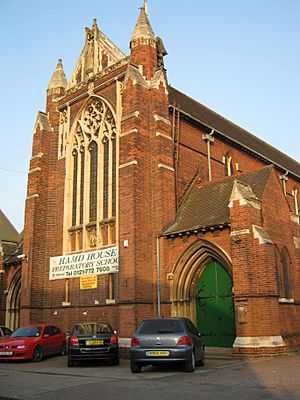St Oswald's Church, Small Heath facts for kids
Quick facts for kids St Oswald’s Church, Small Heath |
|
|---|---|

St Oswald’s Church, Small Heath (2011)
|
|
| 52°28′6.33″N 1°51′8.85″W / 52.4684250°N 1.8524583°W | |
| Location | Small Heath, Birmingham |
| Country | England |
| Denomination | Church of England |
| History | |
| Dedication | Oswald of Worcester |
| Consecrated | 27 September 1893 |
| Architecture | |
| Architect(s) | William Bidlake |
| Groundbreaking | 1892 |
| Completed | 1893 |
St Oswald's Church in Small Heath, Birmingham is a special building. It used to be a parish church for the Church of England. Today, it is no longer a church. It is considered a very important historical building, known as a Grade II* listed building. This means it has special protection because of its history and architecture.
Contents
Building History
How the Church Was Built
The church was designed by a talented architect named William Bidlake. Construction started in 1892 and finished in 1893. On September 27, 1893, the church was officially opened and blessed for worship. This special ceremony is called a consecration.
Early Years and Growth
St Oswald's Church began as a "mission" from St Andrew's Church, Bordesley. This means it was a new church started by an older, more established one. The church was made bigger between 1899 and 1900 to welcome more people.
Inside the church, there were beautiful artworks. The altarpiece, which is a piece of art behind the altar, was created by Sidney Meteyard in 1916. There was also a statue of St Oswald, carved by George Latham.
William Bidlake, the architect, also designed the vicarage. A vicarage is the house where the vicar, or priest, lives. This house was built on Dora Road in a style called Arts and Crafts. This style focuses on traditional craftsmanship and simple forms.
Changes Over Time
In 1924, a part of St Oswald's church area, called its parish, was used to create a new parish for St Gregory the Great's Church, Small Heath. A parish is like a local neighborhood area that a church serves.
Later, St Oswald's Church closed its doors as a place of worship. The building was then changed into a preparatory school. A preparatory school is a school for younger children. The original parish of St Oswald's joined with St. Aidan's Church, Small Heath. This combined parish was then renamed All Saints.
The Church Organ
A Special Musical Instrument
St Oswald's Church had a large pipe organ. This organ was built by William Hill & Sons in 1846. It was originally located in St Peter's Church, Handsworth. Later, this impressive musical instrument was moved to St Oswald's. You can find detailed information about this organ in the National Pipe Organ Register.
 | Percy Lavon Julian |
 | Katherine Johnson |
 | George Washington Carver |
 | Annie Easley |

